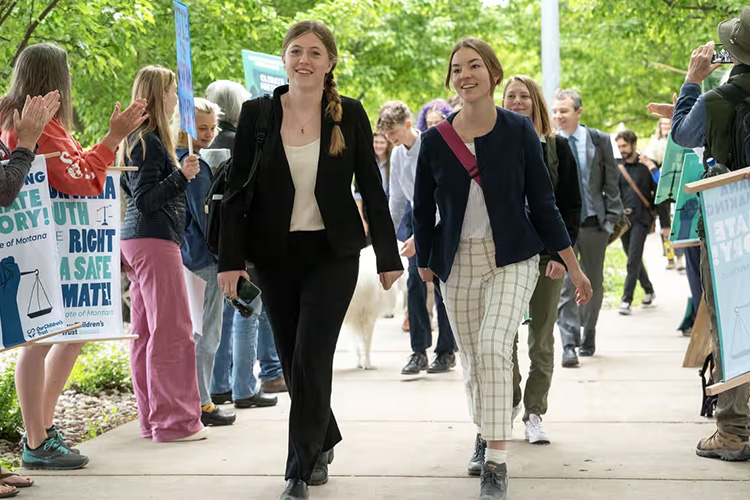
The Held v Montana plaintiffs aimed to advance awareness of the impacts of climate change in their state. photo by Robin Loznak
A group of young Montanans have won a lawsuit against the state that alleged the state’s use of fossil fuels has violated their constitutional rights.
Climate change is a big issue – one that affects everyone. Yet governments in many areas are not taking action. In some states, lawmakers are even preventing measures that would help the climate. Earlier this year, Montana passed a bill that prevents lawmakers from considering the effect fossil fuel emissions might have on the climate.
Montana, like all other states, has been heavily affected by climate change. Catherine Johnson, a Montana resident, has noticed the effects of it on her ranch. “We’re always at the risk of those types of weather events,” she said. She described the extremely hot summers that have become more common, along with longer and colder winters, and the consequences they can have. “It affects being able to feed the cattle, which is our livelihood,” Johnson explained.
Similar impacts have been felt across the state, which is one reason why the anti-climate bill was opposed by many Montanans. That opposition includes a group of 16 young people who brought a lawsuit against the state. They argued that Montana has violated their constitutional rights by passing this bill, since there is a provision in the Montana state constitution that guarantees the right to a “clean and healthful environment in Montana for present and future generations.” By producing, using, and promoting fossil fuels, Montana has threatened the clean environment to which residents are entitled.
Across the country, many other cases like this have been filed. Most of them have been dismissed, but on August 14, Judge Kathy Seeley ruled in favor of the Montana plaintiffs. During the trial, the plaintiffs explained the many negative impacts climate change has had on their physical and mental health in addition to its impacts on the natural environment. Judge Seeley cited those claims, testimonies from experts, and undisputed facts about climate change to support her ruling. The plaintiffs, along with many other Montanans, celebrated, calling the ruling “monumental” and a “sweeping win” for the climate.
However, not everyone in Montana is happy with this ruling. The production of fossil fuels is a big part of Montana’s economy, and one-third of the state’s energy comes from coal. This caused many lawmakers in Montana to speak out against the trial. Many have also said that since Montana’s greenhouse gas emissions are too small to matter on a global scale, the state should not have to take action to reduce its emissions. The plaintiffs in the case pushed back, saying that Montana has a responsibility for its part in global greenhouse gas emissions, no matter how small that part is.
Still, this ruling has the potential to massively impact future climate legislation, both in Montana and other states. If the case survives an appeal, Montana lawmakers would have to consider how its policy decisions will affect climate change. In other areas, climate advocates are hopeful that this ruling will put pressure on government leaders to take action on climate change. Either way, this case is sure to influence future climate legislation.